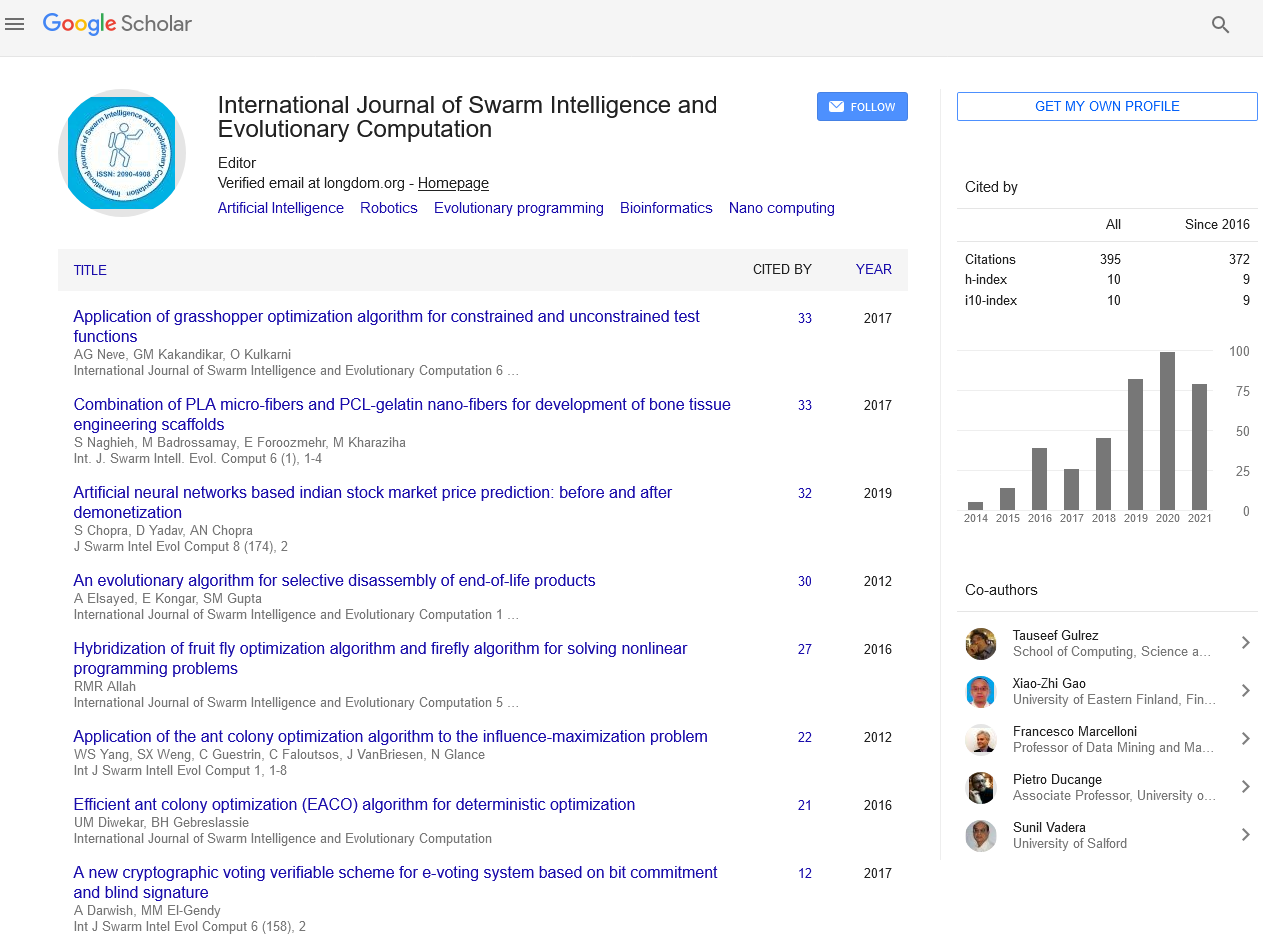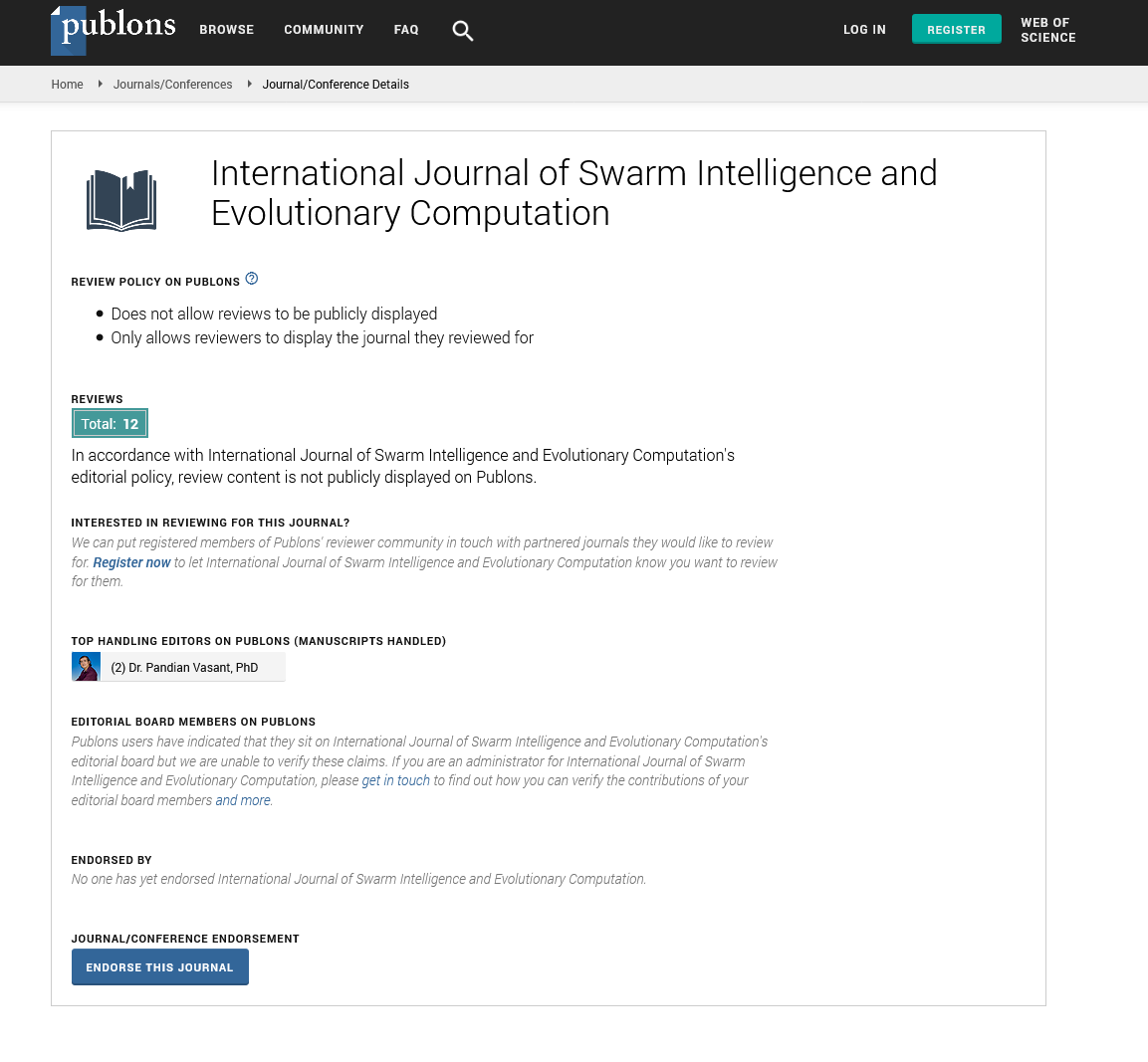Indexed In
- Genamics JournalSeek
- RefSeek
- Hamdard University
- EBSCO A-Z
- OCLC- WorldCat
- Publons
- Euro Pub
- Google Scholar
Useful Links
Share This Page
Journal Flyer

Open Access Journals
- Agri and Aquaculture
- Biochemistry
- Bioinformatics & Systems Biology
- Business & Management
- Chemistry
- Clinical Sciences
- Engineering
- Food & Nutrition
- General Science
- Genetics & Molecular Biology
- Immunology & Microbiology
- Medical Sciences
- Neuroscience & Psychology
- Nursing & Health Care
- Pharmaceutical Sciences
Commentary - (2023) Volume 12, Issue 2
Applications and Challenges of Ontology Engineering
Topely Leoneles*Received: 22-Feb-2023, Manuscript No. SIEC-23-20952; Editor assigned: 24-Feb-2023, Pre QC No. SIEC-23-20952 (PQ); Reviewed: 10-Mar-2023, QC No. SIEC-23-20952; Revised: 17-Mar-2023, Manuscript No. SIEC-23-20952 (R); Published: 27-Mar-2023, DOI: 10.35248/2090-4908.23.12.302
Description
Ontology engineering is a crucial discipline of computer science that deals with the development and maintenance of ontologies, which are formal representations of knowledge in a specific domain. Ontology engineering is a complex process that requires careful analysis, design, and development of ontologies.
Ontology engineering involves several key components, including ontology specification, ontology design, ontology development, and ontology evaluation. Ontology specification involves defining the scope, purpose, and intended users of the ontology. Ontology design involves creating a conceptual model of the domain, which includes identifying classes, properties, and relationships between them. Ontology development involves implementing the ontology in a specific ontology language. Ontology evaluation involves assessing the quality and effectiveness of the ontology in meeting its intended objectives.
Applications of ontology engineering
Ontology engineering involves the creation, maintenance, and deployment of ontologies, which are formal representations of knowledge. These ontologies can be used in various applications, including:
Information retrieval: Ontologies can be used to improve the accuracy of search results by helping to understand the meaning of terms and relationships between them.
Knowledge management: Ontologies can help organize and manage knowledge in a more structured and systematic way. They can also facilitate the sharing and reuse of knowledge across different systems and applications.
Semantic web: Ontologies are a key component of the Semantic Web, which aims to make web content machine-readable and understandable by computers.
Natural language processing: Ontologies can be used to improve natural language processing by providing a framework for understanding the meaning of words and sentences.
Robotics: Ontologies can be used to enable robots to better understand their environment and perform tasks more efficiently and accurately.
Healthcare: Ontologies can be used to improve healthcare by providing a standardized way to represent medical knowledge and improve the interoperability of healthcare systems.
E-commerce: Ontologies can be used to improve product search and recommendation systems by providing a more structured and accurate representation of products and their attributes.
Overall, ontology engineering has many potential applications in various fields and can help improve the accuracy, efficiency, and interoperability of various systems and applications.
Challenges in ontology engineering
Ontology engineering poses several challenges, including ontology heterogeneity, ontology evolution, and ontology alignment. Ontology heterogeneity refers to the differences in terminology, concepts, and knowledge representation between different ontologies. Ontology evolution refers to the dynamic nature of ontologies, which requires continuous updates and modifications to reflect changes in the domain. Ontology alignment refers to the process of integrating different ontologies to ensure consistency and interoperability.
Future directions in ontology engineering
The future of ontology engineering lies in addressing the challenges mentioned above and exploring new applications of ontologies in emerging fields such as artificial intelligence, big data analytics, and the internet of things. Ontology engineering can play a crucial role in enabling the semantic interoperability and integration of data and applications in these fields. Moreover, advances in ontology engineering tools and techniques, such as ontology learning, ontology visualization, and ontology mapping, can improve the efficiency and effectiveness of ontology engineering processes.
Conclusion
Ontology engineering is a vital discipline that plays an important role in enabling knowledge sharing, integration, and management across different domains. It involves several key components, including ontology specification, ontology design, ontology development, and ontology evaluation. Ontology engineering has many applications in various fields, including information retrieval, knowledge management, natural language processing, and semantic web technologies. However, ontology engineering poses several challenges, including ontology heterogeneity, ontology evolution, and ontology alignment. The future of ontology engineering lies in addressing these challenges and exploring new applications of ontologies in emerging fields such as artificial intelligence, big data analytics, and the internet of things.
Citation: Leoneles T (2023) Applications and Challenges of Ontology Engineering. Int J Swarm Evol Comput. 12:302.
Copyright: © 2023 Leoneles T. This is an open-access article distributed under the terms of the Creative Commons Attribution License, which permits unrestricted use, distribution, and reproduction in any medium, provided the original author and source are credited.


